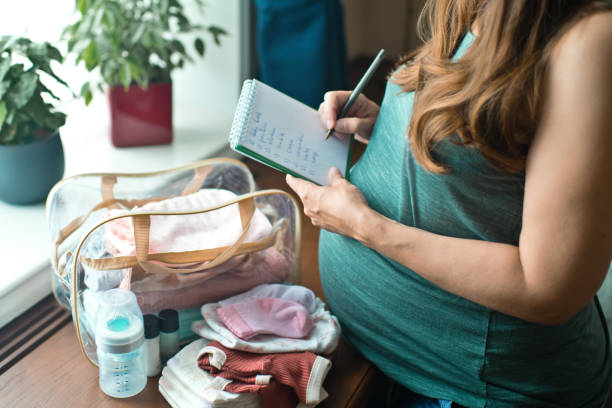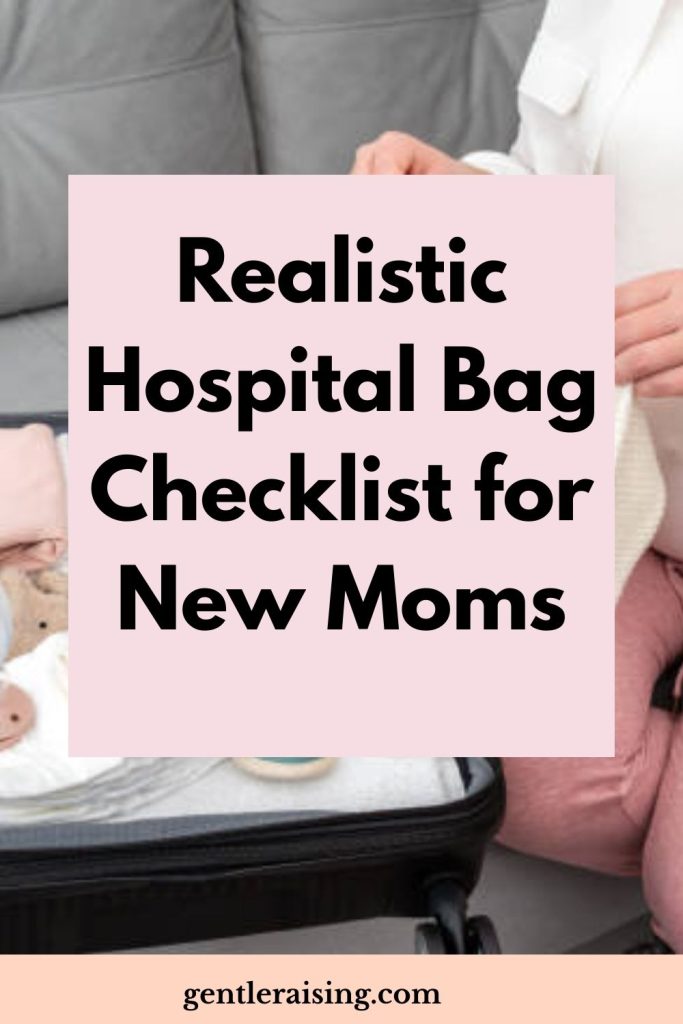That “Am I Forgetting Something?” Feeling
You know that restless night before a big trip, when you keep checking if you packed your toothbrush or your charger? Multiply that by ten, and you’ll get pretty close to how most expecting parents feel about the hospital bag. Packing it somehow makes everything real. It’s exciting, nerve-racking, and honestly kind of confusing.
Because here’s the thing: you’re preparing for one of the biggest moments of your life, and yet you don’t exactly know what you’ll want until you’re there. Will you need cosy socks or will hospital socks do? Should you pack snacks even if the cafeteria is open? What about makeup—unnecessary or your little slice of normalcy?
Let me reassure you right away: there is no single “perfect” hospital bag. There’s just what makes you feel ready. Think of it less like a checklist for survival and more like packing for comfort, sanity, and those early moments you’ll remember forever.
When Should You Pack the Bag?
There’s no official rule stamped on a calendar, but most doctors and nurses recommend having it ready around 34 to 36 weeks. That’s late enough that you won’t be staring at it for months, but early enough to avoid scrambling if baby decides to surprise you.
Some parents start earlier because peace of mind matters more than timing. If you’re someone who sleeps better knowing the suitcase is sitting by the door, go ahead and pack it at 30 weeks. Others wait until the last minute and throw things together between contractions (and you know what, they survive just fine too).
Quick note: if the baby does come early, don’t panic. Hospitals have the basics covered: diapers, wipes, baby blankets, mesh underwear (the glamorous stuff), and those oh-so-chic gowns. The bag is about comfort, not survival.
Essentials for Mom: Comfort Is the Name of the Game
Let’s be blunt: hospital gowns are about function, not fashion. They’re loose, practical, and easy for nurses to manoeuvre. But after a while, you might crave something that feels more “you.” That’s why your own clothes can make such a difference.
- Loose clothes and gowns: Think oversized T-shirts, stretchy yoga pants, or a nightgown that buttons in the front (great for nursing).
- Nursing bras or tanks: Even if you’re undecided on breastfeeding, they’re comfortable and easy.
- Going-home outfit: Skip the jeans. Your body won’t magically snap back to pre-pregnancy size. Aim for maternity leggings or that trusty maxi dress you’ve worn a hundred times.
Toiletries are the next category where personal comfort makes a big difference. A hospital bathroom isn’t a spa, but bringing your own soap or face wash can help you feel like yourself. And please, for the love of chapped lips—bring lip balm. Hospital air is dry, and between breathing heavily and the room’s temperature control, your lips will thank you.
Other little lifesavers:
- Hair ties or scrunchies (you’ll misplace them otherwise).
- Travel-size shampoo, conditioner, body wash.
- A toothbrush that isn’t wrapped in plastic by the hospital.
- Lotion or moisturiser (dry air strikes again).
Technology-wise, don’t forget your phone charger, and not the short cord. Go for a 6- or 10-foot cable, because outlets always seem to be in weird spots. A tablet, headphones, or even a Kindle can be a good distraction during downtime.
And then there’s emotional comfort. Some moms swear by bringing their favourite pillow from home (just put a patterned pillowcase on it so it doesn’t get mixed up with hospital ones). Others bring a blanket that smells like their house. Tiny details like that can make sterile walls feel less intimidating.
Essentials for Baby: Tiny Human, Tiny Needs
Here’s the spoiler: hospitals provide the basics for newborns. Diapers, wipes, swaddles, little hats, they’re usually stocked. But that doesn’t mean you shouldn’t bring your own.
- Onesies: Pack a couple in different sizes (newborn and 0–3 months). Babies have their own opinions about fit.
- Mittens and hats: Some babies come out with surprisingly sharp nails, and mittens keep them from scratching themselves.
- Swaddle or blanket: Yes, the hospital gives you one, but you might prefer your own softer or cuter version.
- Going-home outfit: This is where many parents go sentimental; sometimes it’s a hand-me-down, sometimes it’s brand new.
Non-negotiable: the car seat. You won’t be allowed to leave without it. Install it in your car well before your due date (some fire stations or baby stores even offer free car seat checks).
And here’s a sweet tangent: different cultures have beautiful traditions around a baby’s first outfit. Some families choose colours for good luck, and others use clothing passed down from grandparents. If you’ve got something like that, it’s a lovely way to carry family stories into the new generation.
For Your Partner or Support Person: Don’t Forget Them
Labour isn’t just about the person giving birth; it’s a marathon for the partner, too. And let’s be honest, they sometimes forget they’ll be camping out in that hospital room for hours or days.
So what do they need?
- Snacks: Yes, the cafeteria exists, but at 2 a.m., you’ll want granola bars or trail mix without leaving the room.
- Change of clothes: Something comfortable for sleeping in a chair.
- Toiletries: Toothbrush, deodorant, maybe dry shampoo. Partners are notorious for forgetting these.
- Entertainment: A book, tablet, or even a crossword puzzle. Hours can pass between active moments.
- Pillow or blanket: Hospital chairs aren’t kind to backs.
Here’s a lighthearted truth: most support people don’t expect to sweat during labour, but they do. Emotionally, mentally, sometimes physically. Packing a little bag for them is just as important as packing one for you.
Paperwork and Practical Stuff
It’s not glamorous, but paperwork matters. You’ll need:
- Photo ID
- Insurance card
- Hospital paperwork (sometimes pre-registered)
- Birth plan (if you have one; keep it simple and short)
It’s also handy to bring a notebook and a pen. Nurses give so much information, feeding tips, medication times, discharge notes—that your foggy brain might not catch.
One underrated tip? Bring an extra reusable bag. Hospitals often send you home with freebies: diapers, wipes, formula samples, peri bottles, mesh underwear (don’t laugh, you’ll love them). Having space to carry it all is a win.
Nice-to-Haves (But Not Musts)
Here’s where personal preference shines. Some parents like to keep things minimal; others enjoy making the hospital feel a little cosier.
- Essential oils or a mini diffuser (if scents relax you).
- A stress ball, massage tool, or tennis ball for back pressure during contractions.
- A portable speaker and soft playlist.
- A camera or DSLR if you’re big on photography.
- Makeup or hairbrush—not because anyone expects you to look a certain way, but because it might make you feel better in photos.
And honestly? You might not touch half of this stuff. That’s okay. Sometimes just knowing it’s there helps.
What Not to Pack
Sometimes the harder question is what to leave behind. You really don’t need to bring your whole house.
- Jewellery or valuables: Not worth the worry.
- Too many outfits: You’ll probably stay in the same comfy clothes.
- Pre-pregnancy jeans: Don’t even try.
- Large snacks needing refrigeration: Logistics get messy.
True story: Some parents roll into the hospital with full-size suitcases, only to use about 5% of what they brought. Nurses have seen it all, and they’ll gently laugh with you, not at you.
Seasonal and Cultural Add-Ons
A January baby in Minnesota? Pack extra blankets and layers. A July baby in Arizona? Think light clothes and maybe a small handheld fan. Seasonal comfort makes a huge difference.
Cultural touches matter too. Some families bring herbs, teas, or prayer items. Others bring favourite foods for recovery (like congee, broth, or homemade soup). If something is part of your family’s tradition, don’t hesitate to include it; it can be grounding in a strange environment.
Packing Styles: Minimalist vs. “Everything But the Kitchen Sink”
Here’s a fun observation: parents tend to fall into two camps.
- Minimalists: One tote bag, only the bare bones. Their philosophy is “the hospital has what I need.”
- Maximalists: Rolling suitcase, tote, backpack, cooler bag, maybe even a pillow fort. Their philosophy is “better safe than sorry.”
Both approaches are valid. Packing less can simplify things. Packing more can calm your nerves. The truth? You’ll remember the baby, not the bag.
Final Thoughts: It’s About Peace of Mind
Packing your hospital bag isn’t really about the stuff; it’s about feeling ready for a moment that’s both ordinary (billions of parents have done it) and extraordinary (no one else will ever meet your baby the way you do).
Will you forget something? Maybe. Will it ruin the experience? Absolutely not. Hospitals are prepared, and what matters most is the love in that room.
So pack what makes you feel comfortable, skip the rest, and remember: this bag is just one small part of a much bigger story. You’ve got this.

